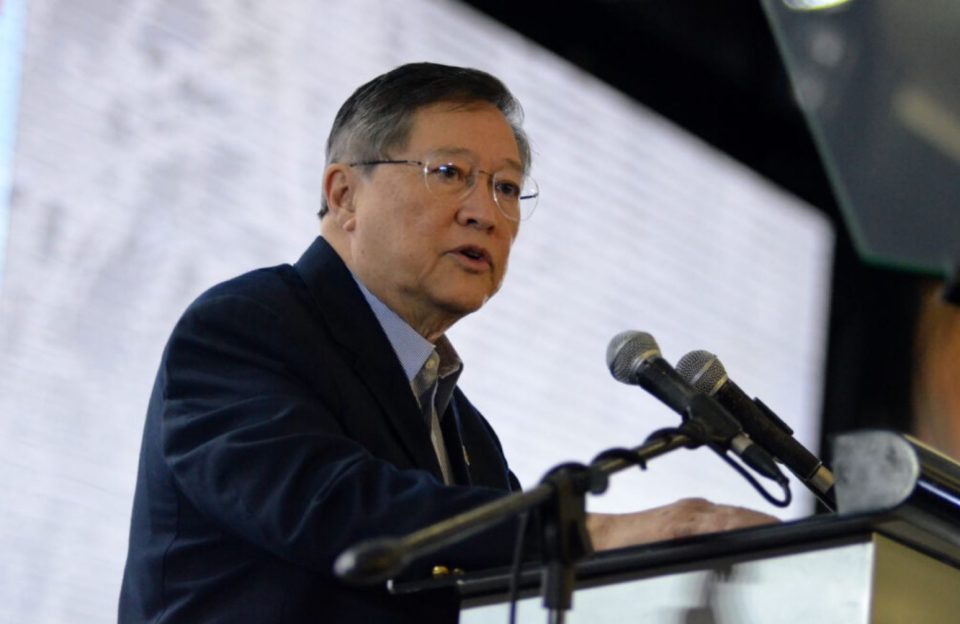(Eagle News) — The Philippines inked on Thursday, Dec. 19, a $400-million loan accord with the World Bank, which represented the first tranche of a three-part financing package that aims to further boost the country’s competitiveness and fiscal sustainability amid the threat of climate change.
Finance Secretary Carlos Dominguez III, on behalf of the Philippine government, and acting Country Director Achim Fock, representing the World Bank, signed the agreement for the development policy loan on implementing the Promoting Competitiveness and Enhancing Resilience to Natural Disasters Sub-Program 1.
“This financing support very clearly helps drive our general effort to build a resilient and competitive society over the medium term. We thank the World Bank for its confidence in our determination to push forward reforms that will create a strong and inclusive economy for our people,” Secretary Dominguez said after the signing ceremony held Thursday (Dec. 19) at the Department of Finance (DOF) Office in Manila.
The $400 million load accord is a component of a three-part loan package from the World Bank with a total amount of US$1.2 billion.

The Department of Finance said that this aims to enhance the country’s resilience to natural disasters and the impact of climate change.
WB acting Country Director Fock said the World Bank is committed to continuing its support to the Philippines’ development agenda.
“My colleagues and I look forward to the continued success of the country’s programs for poverty reduction and inclusive growth. We like to thank the Department of Finance and Secretary Dominguez for his excellent leadership in this important endeavor,” Fock said.
-PHL’s rapid economic growth noted-
He also noted the country’s rapid growth that has so far driven down poverty rates, from 26 percent in 2006 to 16.6 percent in 2018.
“These tangible gains reflect the country’s continuing efforts to improve the lives of Filipino families, based on sound policies and a shared objective of accelerating poverty reduction,” Mr. Fock said.
The loan from the World Bank formalized on Thursday, Dec. 19 “aims to further improve the Philippines’ financial mechanisms available for disaster response, and aid the country in formulating public asset management policies; and enhancing regulation for the insurance market against natural disasters,” the DOF said.
“It will likewise support the government in ensuring food security; streamlining government procedures to simplify the ease of doing business; and increasing access to economic opportunities through the roll out of the national ID and electronic payment systems,” it added.
The Philippines is among the countries most vulnerable to the disastrous impact of erratic weather patterns brought about by climate change.
According to a DOF release, the loan package, which was approved by the World Bank last Dec. 17, has a maturity period of 19 years, inclusive of a 10-year grace period.
Dominguez also explained that with this three-tranche loan, the Philippines expects its loan portfolio with the World Bank to increase to between US$1.5 billion and US$2 billion annually starting next year, which is about thrice times more than the multilateral institution’s average annual lending commitment of US$600 million to the country for the past 10 years.
He said the government was able to access such support from the World Bank as a result of the Duterte administration’s sustained policy efforts to improve the country’s global competitiveness, as shown by the Philippines dramatic leap to 95th to its previous 124th ranking in the Ease of Doing Business Report (EODB) of the Bank.
The Ease of Doing Business (EODB) and Efficient Government Services Act, the Rice Tariffication Law (RTL), the Philippine Identification System Act, the National Payment Systems Act, and the Comprehensive Tax Reform Program (CTRP) as well as the government’s initiatives to improve the economy’s financial resilience against natural disasters are also among the factors that led the World Bank to increase its support to the Philippines, Dominguez said.
(With a DOF release)








